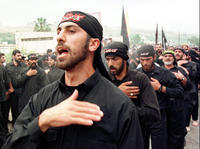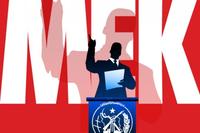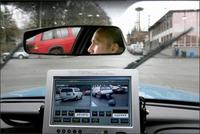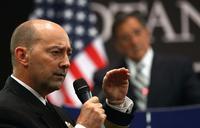-
Venture capital tutorial for New York-based homeland security companies
Long Island technology forum helps connect homeland security companies from the New York region with funding sources
-
-
U.S. Congressman: Hezbollah greater threat than al Qaeda

Al Qaeda is perceived as the primary terror threat to the United States, but Congressman Peter King (R-New York), chairman of the House Homeland Security Committee, sounds the alarm that Hezbollah may be the greater threat
-
-
DHS resisted calls for intelligence on Occupy movement
Internal documents released by DHS demonstrate the efforts made by the department to avoid gathering intelligence on last year’s Occupy movement
-
-
Dueling legislation over cybersecurity regulations
Attacks on U.S. critical infrastructure may bring about a Katrina-like situation: no electricity, no fresh water, limited traffic control, severely curtailed emergency response, and more; about 85 percent of U.S. critical infrastructure is privately owned; two different cybersecurity bills in Congress envision different solutions to U.S. infrastructure’s cyber vulnerability
-
-
U.S, Israel employ shady organization against Iran

Analysts have concluded that the United States and Israel may be in a strategic alliance with a former left-wing Iranian political group instrumental in the 1979 Islamic Revolution and the overthrow of Shah Rezi Pahlavi; the purpose of the alliance is to destabilize the current regime in Iran
-
-
California bill would restrict data usage from license plate scanners

Legislation has been introduced in California to limit the use of data gathered by patrol car-mounted license plate readers, and the duration for which such data may be held; access to the data by other agencies and personnel would be limited as well
-
-
The Transboundary Agreement is not just about the cost of gas and the environment
The Transboundary Agreement, which the United States and Mexico reached on 20 February, regulates oil and gas development in the Gulf of Mexico; before the agreement is ratified, there is a need to address serious security issues related to building more oil rigs in the Gulf – for example, the fact that the Mexican government cannot control its powerful criminal organizations, and that it will be easy for terrorists in a small boat to overrun one of these deepwater rigs
-
-
Updated solution allows quick, secure information sharing
Visual Alert 2 enables law enforcement agencies to get real-time access to police records through Pennsylvania’s Law Enforcement Justice Information System (LEJIS) and other authorized information sharing networks while the department maintains secure control of the information it shares
-
-
Breakthrough in next gen nuclear detectors

Researchers have long struggled to develop radiation detectors that can spot a nuclear device hidden away in a shielded case, but a recent breakthrough could change all that
-
-
Scientists develop a dirty bomb detection system
As part of a £3 million international project funded by the European Commission, scientists at the University of Liverpool are developing a mobile detection system for nuclear materials that could prevent the construction of atomic weapons and dirty bombs
-
-
Killer silk kills anthrax, other microbes dead
A simple, inexpensive dip-and-dry treatment can convert ordinary silk into a fabric that kills disease-causing bacteria — even the armor-coated spores of microbes like anthrax — in minutes
-
-
CDC: outbreaks linked to imported foods increasing
U.S. food imports grew from $41 billion in 1998 to $78 billion in 2007; as much as 85 percent of the seafood eaten in the United States is imported, and depending on the time of the year, up to 60 percent of fresh produce is imported; the increase in imported food has been accompanied by an increase in foodborne illnesses, with fish and spices the most common sources
-
-
NATO commander target of persistent Facebook cyberattacks

The senior commander of NATO has been the target of repeated Facebook-based cyberattacks that are believed to have originated from China; Admiral James Stavridis is the subject of a campaign to gain information about him and his colleagues, friends, and family
-
-
Brown graduate students help bankrupt city create disaster plan
To help the cash-stricken city of Central Falls, Rhode Island, thirty graduate students from Brown University have banded together to help create a disaster preparedness plan
-
-
Tornadoes will not deplete FEMA disaster fund
The latest series of tornadoes that raged across the Midwest and South will not deplete the U.S. disaster fund, which was only recently reloaded by Congress last year, officials said
-
More headlines
The long view
Factories First: Winning the Drone War Before It Starts
Wars are won by factories before they are won on the battlefield,Martin C. Feldmann writes, noting that the United States lacks the manufacturing depth for the coming drone age. Rectifying this situation “will take far more than procurement tweaks,” Feldmann writes. “It demands a national-level, wartime-scale industrial mobilization.”
No Nation Is an Island: The Dangers of Modern U.S. Isolationism
The resurgence of isolationist sentiment in American politics is understandable but misguided. While the desire to refocus on domestic renewal is justified, retreating from the world will not bring the security, prosperity, or sovereignty that its proponents promise. On the contrary, it invites instability, diminishes U.S. influence, and erodes the democratic order the U.S. helped forge.
Fragmented by Design: USAID’s Dismantling and the Future of American Foreign Aid
The Trump administration launched an aggressive restructuring of U.S. foreign aid, effectively dismantling the United States Agency for International Development (USAID). The humanitarian and geopolitical fallout of the demise of USAID includes shuttered clinics, destroyed food aid, and China’s growing influence in the global south. This new era of American soft power will determine how, and whether, the U.S. continues to lead in global development.
Water Wars: A Historic Agreement Between Mexico and US Is Ramping Up Border Tension
As climate change drives rising temperatures and changes in rainfall, Mexico and the US are in the middle of a conflict over water, putting an additional strain on their relationship. Partly due to constant droughts, Mexico has struggled to maintain its water deliveries for much of the last 25 years, deliveries to which it is obligated by a 1944 water-sharing agreement between the two countries.
How Disastrous Was the Trump-Putin Meeting?
In Alaska, Trump got played by Putin. Therefore, Steven Pifer writes, the European leaders and Zelensky have to “diplomatically offer suggestions to walk Trump back from a position that he does not appear to understand would be bad for Ukraine, bad for Europe, and bad for American interests. And they have to do so without setting off an explosion that could disrupt U.S.-Ukrainian and U.S.-European relations—all to the delight of Putin and the Kremlin.”
How Male Grievance Fuels Radicalization and Extremist Violence
Social extremism is evolving in reach and form. While traditional racial supremacy ideologies remain, contemporary movements are now often fueled by something more personal and emotionally resonant: male grievance.
